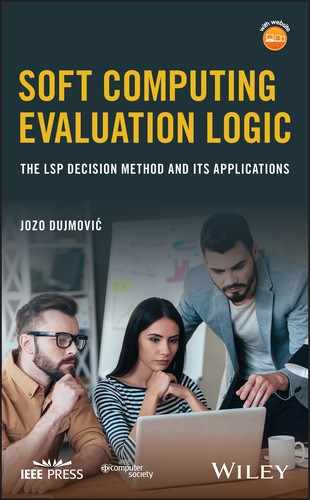PART THREE
LSP METHOD
In the beginner's mind there are many possibilities. In the expert's mind there are few.
—Shunryu Suzuki
In Part Three we present the Logic Scoring of Preference (LSP) method for evaluation, comparison, and optimization of complex systems. The point of departure is an overview of the LSP method presented in Chapter 3.1. The presentation in Chapter 3.1 is simple and suitable for all readers. All other chapters in Part Three provide refinements and extensions of the material presented in Chapter 3.1.
The goal of Part Three is to introduce the LSP Decision Engineering Framework (LSP DEF) as a set of professional evaluation techniques and evaluation tools developed from the theoretical basis of graded logic and aggregation introduced in Part Two.
The LSP DEF is developed for solving professional evaluation problems (i.e., problems that need a significant level of domain expertise). For example, the evaluation of computer systems, medical conditions, military equipment, complex software systems, urban plans, and ecologic solutions would not be possible without appropriate domain expertise. So, in many cases domain experts are interested in evaluation methodology and evaluation problem solving using the LSP method. Part Three of this book is written having in mind the needs of all kinds of professional evaluators, including both decision analysts and a wide variety of domain experts.
Evaluation problems that are less dependent on professional expertise in a specific domain are usually personal decision problems, such as evaluating and selecting jobs, cars, homes, and schools for students. Such problems are extremely frequent, but are rarely solved using any quantitative methodology. The main reason for our interest in such evaluation problems is their educational value, and they will be presented both in Part Three and in Part Four of this book. Indeed, such problems are accessible to all categories of readers and enable readers to focus on fully exposed decision aspects of the problem. On the other hand, the need for domain expertise as a prerequisite for building and using evaluation models significantly reduces the number of those who can follow the logic of evaluation. Let us note that the low frequency of quantitative methods in personal decision making also reflects the lack of appropriate decision support tools, specifically designed to be suitable for use by the general population.
